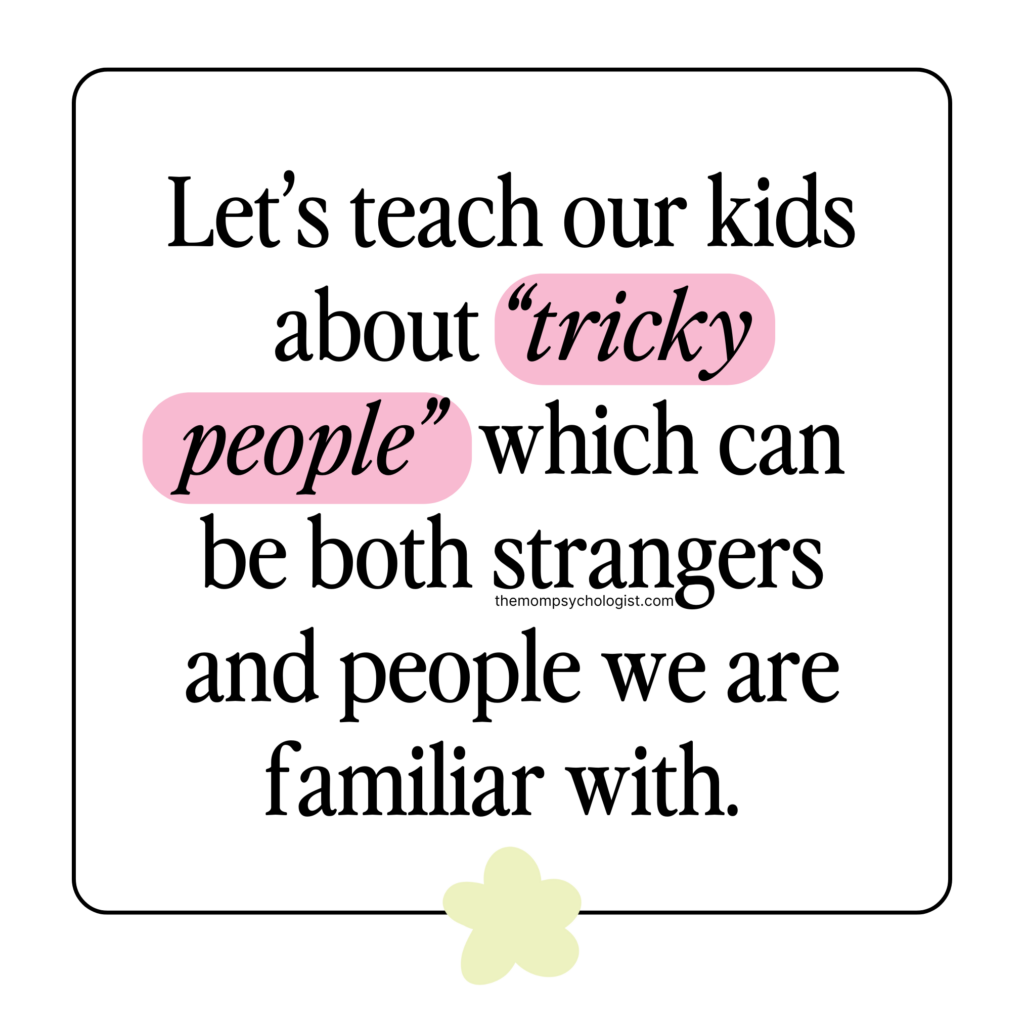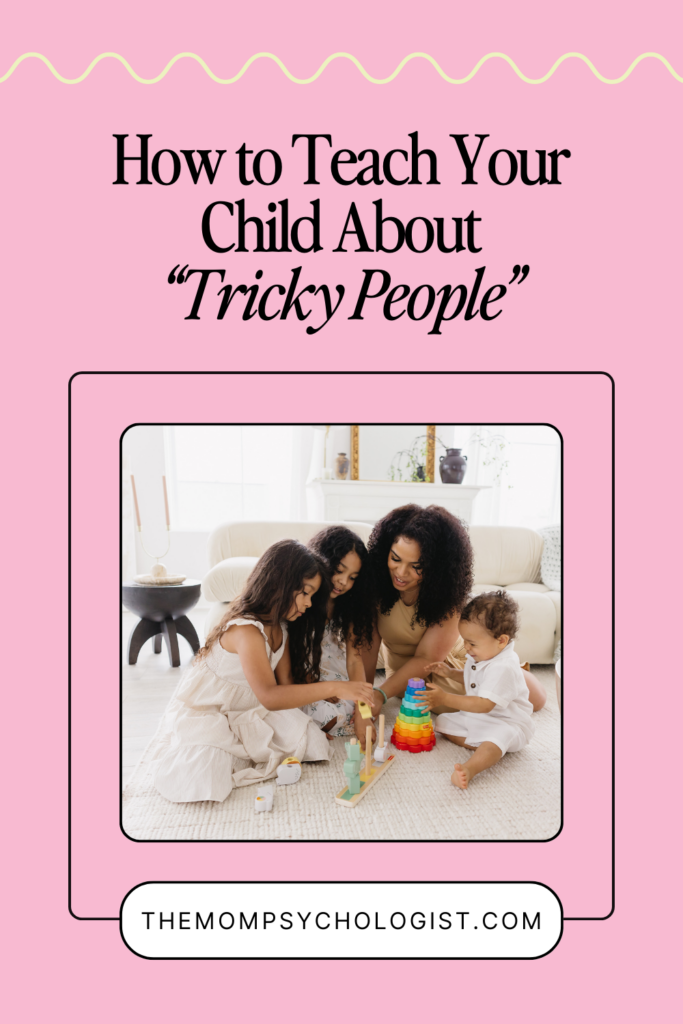watch now!
A place where I discuss all things related to toddlers and motherhood!
Subscribe to my Youtube channel
As a clinical psychologist, published author, and mother to two cheeky young children, I get it. I’ve spent YEARS researching and filtering through the noise online, so you don’t have to.
PARENTING TIPS
POTTY TRAINING
ANTIRACISM
PLAY
Blog Topics
SIBLING RIVALRY
SCREEN TIME
TANTRUMS
DISCIPLINE
Hi I'm Dr. Jazmine
The #1 Life Saving Skill You Can Teach Your Child (“Tricky People”)
topics:
Rather listen? You can do so here!
Many of us were taught ‘stranger danger’- Don’t talk to strangers. Don’t trust them. Leave them alone.
Yet only 28 percent of child abductions happen by strangers. And when it comes to child abuse in general, the vast majority of it happens at the hands of someone children trust.
It is not strangers we need to be teaching our children about, it is how to navigate the people they know, like and trust.
So instead of teaching our kids an outdated concept like “stranger danger,” teach them about “tricky people” which can be both strangers and people we are familiar with.
Start having these conversations around ages 4 or 5.
Here is how to talk to kids about “tricky people” without causing fear.
What is a “tricky person”?
A tricky person is anyone (whether we know them or not) who tries to trick you into doing something you are not supposed to do.
Patty Fitzgerald, founder of Safely Ever After, coined the term “tricky people” and she has amazing resources including two books, “No Trespassing” and “Super Duper Safety School.”

When teaching your child about “tricky people” it’s important to teach them:
- Important signs to look out for
- To pay attention to how people act and how their actions make them feel.
- Whether or not they’re being asked to break safety rules.
5 Common Signs of “Tricky People”:
- Ask kids to help them. (e.g., find a lost pet, get groceries to their car). Teach your child that when adults need help, they will ask other adults. It is a red flag if an adult you don’t know asks you for help. Tell them to always ask for permission if they want to off and help an adult.
- Ask kids to keep a secret (e.g., “Don’t tell your parents.”). A red flag is if they make threats (e.g., “If you tell, you’ll be in trouble or I won’t talk to you.”).
During these conversations, explain that we don’t keep secrets, only fun surprises (e.g., like birthday presents), and that no adult should be asking you to keep a secret. Most importantly, they will never get in trouble for sharing a “secret.” The book Let’s Talk About Body Boundaries, Consent and Respect does a great job at educating kids on this concept in a fun way.
This part is really important and ties into how we raise our children in general. When it comes to discipline, we have to be aware of the messages we are sending them about mistakes and “getting in trouble.” My children do not “get in trouble” (i.e., punished) when they make mistakes or otherwise do not do what I ask them to do. They get talked to. There’s a conversation, a teaching moment but not a punishment.
People who are trying to manipulate your child will use fear tactics like “getting in trouble” because they know many children fear their parents. If your child fears you, and they worry they will be “in trouble”, they are going to second guess coming to you when there is a problem. In my online discipline course, I teach parents how to discipline (which means to teach) in ways that don’t cause harm but also don’t turn you into a permissive parent, either.
As parents, we are our children’s safe haven. They should be able to come to us when there is a problem. If they can’t, then there is a problem with our parenting approach, not our child.
I want to make another point about threats because peers do this a lot (e.g., “If you don’t do this I won’t be your friend.”). In essence, this is peer pressure. From an early age, children need to be taught what “peer pressure” is and what it sounds like.
Relationships should not have conditions on them. If a ‘friend’ ever wants you to do something and uses their friendship (or a reward like candy, toys, etc) as a way to try to control you, this is not real friendship. This is peer pressure and manipulation. It’s not that we need to vilify their friends, though. Just simply pointing this out and saying something like, “A true friend doesn’t try to get you to do something you don’t want to. It’s ok to say ‘No’.”
In essence, peers can be added to the list of possible ‘tricky people’ and it is important you have ongoing conversations about this reality in a way that educates and empowers them to think critically about their relationships and the choices they make. Teach them the ins and outs of peer pressure (e.g., what it sounds like, why people do it and how to respond) because no one else will teach them this.

- Try to arrange alone time with them. Teach your child that it is best to have two adults present and/or other kids around. They should always get permission from you or another trusted adult before going somewhere alone with another adult.
- Says, “It’s an emergency! You need to come with me right now!” Again, this is a tactic tricky people will use to try to force your child to do what they say. Your child needs to know this and be reminded that they must ask permission first before going off with someone.
- Ask you to do something that breaks a family rule or makes you feel uncomfortable. (e.g., touches you in ways that feel uncomfortable, makes you touch them, or takes pictures of private parts, etc).
Quick tip: Create a unique family password as a way of “testing” a potentially tricky person. Teach them that if they were ever asked to go somewhere alone, to ask the person for the password first. Explain that they are not allowed to tell anyone the password and only someone who received our permission would know it. This is great for kids 5 and up.
The key to empowering kids (and not frightening them) when having these conversations is to:
- Frame the information as important skills they are ready to learn now that they’re older and more responsible (start conversations around age 4).
- Keep the conversation positive and centered around “I’m teaching you this so you know how to keep yourself safe.”
- Role play these scenarios so your child knows what it may sound like and how to respond.
- Always end with, “What questions do you have?”

In summary, teach kids:
- A “tricky person” is anyone (Stranger or familiar person) who tries to get them to break the safety rules. For the purposes of this conversation, safety rules include:
- Asking permission from a trusted adult (e.g., parent, family member, teacher, etc) before going off with someone.
- We don’t keep secrets (only surprises).
- Your body, your rules. No one should be touching your private parts (or taking pictures) and you shouldn’t be touching theirs.
- To trust in themselves and pay attention to how people act and how their choices impact the way you feel
- They will never get in trouble for coming to you with a problem or question.
Have these conversations on an ongoing basis. Keep the conversations based on empowerment (not fear) and remember to be conscious of the ways in which you may be inflicting fear in your parenting approach. Keep the relationship (not compliance or control) number one priority.
If you’re wanting to find ways to connect with your child in deeper ways and/or discipline without inflicting fear or harm, then check out my free discipline workshop.
That’s it for this letter. Keep me posted on how these conversations with your little ones go.
Until next week,
Dr. Jazmine
Was this helpful? Save it for later!

Leave a Reply Cancel reply
Copyright The Mom Psychologist® 2025
grab my free script pack!
explore
work with me
information
About
Blog
YouTube
Podcast
Privacy Policy
Terms of Use
Product Disclaimer
Contact
TMP Times (Newsletter)
Children should be unequivocally taught that sound mental health as well as physical security is every child’s right, especially considering the very troubled world into which they never asked to enter. And not being mentally, let alone physically, abused within or by the educational system is definitely a moral right.
As a boy with an undiagnosed autism spectrum disorder, my Grade 2 teacher was the first and most formidably abusive authority figure with whom I was terrifyingly trapped. I cannot recall her abuse in its entirety, but I’ll nevertheless always remember how she had the immoral audacity — and especially the unethical confidence in avoiding any professional repercussions — to blatantly readily aim and fire her knee towards my groin, as I was backed up against the school hall wall.
Luckily, she missed her mark, instead hitting the top of my left leg. Though there were other terrible teachers, for me she was uniquely traumatizing, especially when she wore her dark sunglasses when dealing with me. But rather than tell anyone about my ordeal with her and consciously feel victimized, I instead felt some misplaced shame: I was a ‘difficult’ boy, therefore she likely perceived me as somehow ‘deserving it’.
I was much too young to perceive how a regular-school environment can become the traumatizer of susceptible children like me; the trusted educator indeed the abuser.
Good article. What about strangers who’ve said to children “I’ve seen you around. You’re not doing anything…”
Ehat then?
Good article. What about strangers who’ve said to children “I’ve seen you around. You’re not doing anything…”
What then?